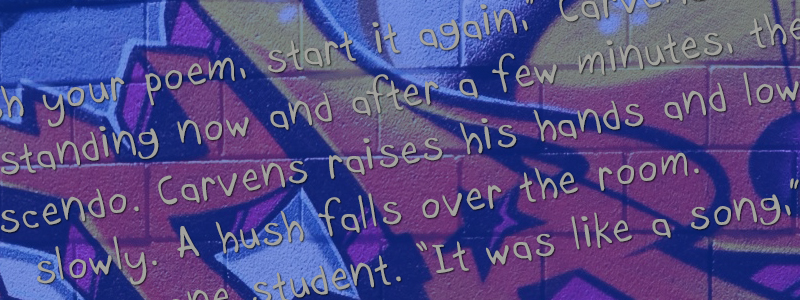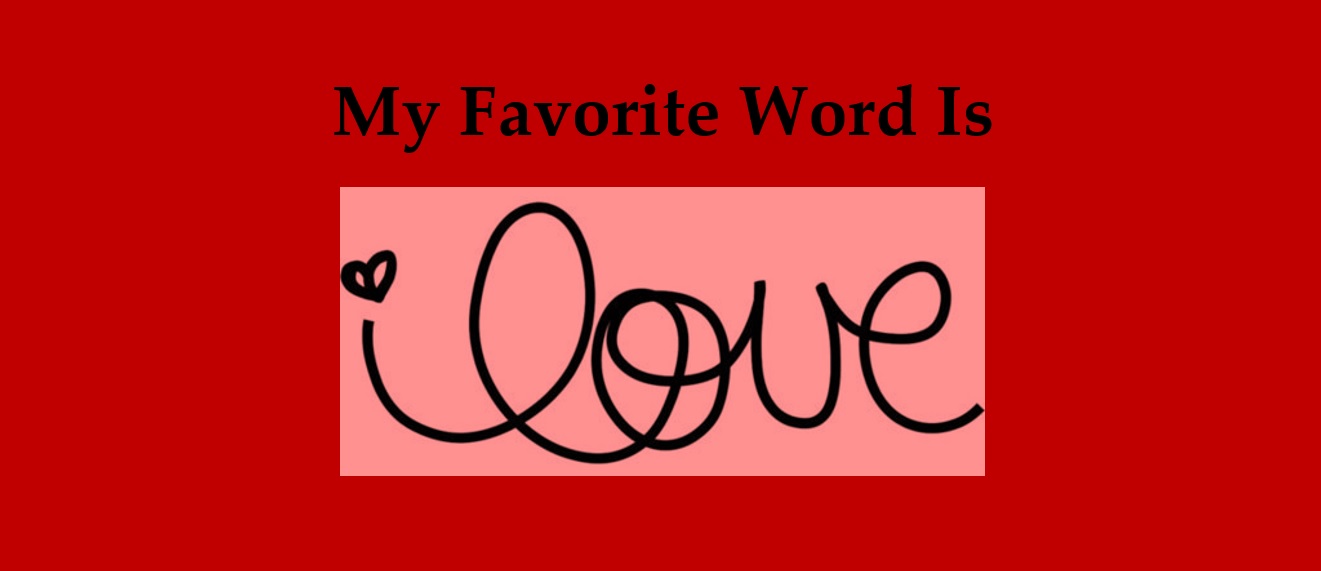Originally published in Teachers & Writers Magazine (Spring 2009, Volume 40, Number 3).
The students show up at today’s performance poetry workshop in typical teenage style: jeans and sneakers, hunched under backpacks and texting madly into their cell phones. Greetings and gossip flutter among the twenty or so youth as they slide into seats around a large table in Urban Word NYC’s Midtown Manhattan office. Once class begins, however, they are all business. For six weeks they have written and refined, practiced and perfected; they’ve received guidance and feedback from the workshop mentor—in this case, writer and performer Mikal Amin Lee—as well as their peers, including one youth leader, Carvens Lissaint. Now it’s time to slam.

One by one, the students walk to the front of the room and, in slam parlance, “spit” their poems. But “spit” feels like the wrong term. These are poems of tremendous eloquence, charged with passion and brought to physical life in the bodies of the performers. The young poets speak of addiction, abuse, love, race, AIDS, suicide; they approach difficult subjects with fierce imagery and incisive metaphors. The influence of written poetic tradition hums just under the surface, occasionally rising in a rhetorical flourish or a title (one student, for example, performed a poem entitled “22 Ways of Looking at a Nigger”). It’s hard to imagine Wallace Stevens, though, igniting this kind of audience engagement: snapping fingers, pumping fists, whistles, “ohhhs” and “aww yeaaahs.” The listeners are in tune and invested. Something else is going on here, something more than poetry.
Indeed, these teenagers act less like classmates and more like a community. It doesn’t take long to recognize that spoken word—the art and craft of writing a poem with the specific intention of performing it—plays a critical role in developing those bonds. Performance poetry demands a level of personal investment for both writers and audience members that isn’t always present in poetry written only for the page. Urban Word mentors emphasize sincerity and honesty, encouraging students to become vulnerable within the safe space of the workshop. Vulnerability leads to authenticity, and authenticity is central to creating the intimate connection between poet and listener that is so important in spoken word. Inauthenticity on the page can be disguised with flashy language or careful imagery; for inauthenticity on the stage, there is no disguise.
The students’ vulnerability sometimes shows up in unexpected ways. One girl in today’s workshop is hesitant to share; Mikal encourages her to push through her anxiety. She starts and stops her poem several times before asking, “Can’t someone else go first? I really can’t do this.” Mikal nudges her onward. “It’s important practice,” he says. “On stage, you have to be ready for anything.” It becomes clear, however, that she’s blocked. After a few more false starts, she gets overwhelmed by frustration and, holding back tears, leaves the room. Carvens, the youth leader, follows her into the hallway to talk things through. A heavy pause descends on the round table for a moment before another student is called upon to share her poem.
Urban Word NYC was founded in 1999, originally under the auspices of T&W, on the belief that “teenagers can and must speak for themselves.” Michael Cirelli, the organization’s director since 2004, considers teenagers to be “probably the most marginalized group in the country. They’re oppressed in their own ways—as people of color, as young women—and on top of that, they don’t have a voice. Schools aren’t created in a way to hear them. Government isn’t created in a way to hear them.” Cirelli points out that classrooms, for example, often focus on the flow of information from teacher to student, rather than the other way around. Urban Word, on the other hand, was created with the precise goal of allowing these perspectives to be heard by providing free, safe, uncensored spaces for youth to discover and explore their unique voices through written and spoken word.
The New York–based organization is involved in a number of large-scale, public programs and events, including the Annual New York City Teen Poetry Slam, the New York Knicks Poetry Slam, and various festivals, open mics, and local and national youth slams. But the “bread and butter” of the organization, as Cirelli says, are the workshops. Courses range from “Hip-Hop Poetry & the Classics,” in which students study literary devices used by both classical poets and hip-hop artists, to “Working Toward Rupture, Working Toward Rapture,” which leads students to experiment with “notions of the ecstatic.” Topics are intentionally broad in order to allow the students to follow their own interests in the classroom. Urban Word encourages mentors to draw on a wide variety of resources, and many workshops thus involve exposure to outside genres such as film, music, photography, collage, and local media.
Urban Word mentors—a community in their own right—often come from backgrounds that are culturally relevant to the students with whom they work (primarily minority youth from low-income urban areas). Curriculum, they believe, is less important than atmosphere; mentors focus on cultivating an environment of mutual respect. As one of the program’s mottos states, “you can say anything as long as it’s not harmful to anyone else.”
Much of Urban Word’s pedagogical approach is inspired by Paulo Freire, the Brazilian educator and author of the classic book Pedagogy of the Oppressed. Freire argued for a more equality-oriented educational environment, in which the teacher also learns and the student also teaches. Cirelli constantly emphasizes Urban Word’s student-centered approach, and considers spoken word “the perfect vehicle” for youth to harness their voices and be empowered in an educational setting: in performance poetry, “you acknowledge and then speak on something; you learn and then you act.”
The first step in this process, and in the workshop setting, is for students to create their poems, which demands that they think critically about their environment, acknowledging what affects them and what they affect in turn. As the weighted content of the students’ poems demonstrates, spoken word is often seen as a channel for youth to examine the “politics of self, of community, of society,” says Cirelli. In-class exercises are no different from what you’d find in any other creative writing workshop—free writes, writing in response to prompts, close readings of literary texts (or close listenings of song lyrics), and so on—but with the added lens of youth self-realization, activism, awareness, and, in many cases, social justice.
After the process of reflection and critical thinking that’s called for in creating the poem, the next step is action: the students are asked to bring the poem to an audience during a performance. Cirelli feels that “traditionally, even if we learn about things that are affecting our world, we’re not encouraged to act upon them. Spoken word, even though it’s on stage and through a microphone, is a direct form of action. That’s really empowering for youth. When you read a poem on stage for the first time, you get that feeling—it’s cathartic, you’ve let it go, you’ve released it into the world.”
Of course, the act of bringing a poem alive on stage is fraught with challenges and requires particular attention in the classroom. Urban Word offers several workshops specifically on how to make performance choices that “heighten the poem’s life.” The added layer of performance—the most direct line from poet to audience—offers students yet another realm in which to “own” their poems. It’s not about cultivating a particular slam style, says Cirelli, but about helping young poets maximize their opportunities to explore their unique voices. The body itself is a tool, and the way students use their physical presence can intensify the meaning of their words. This might mean sweeping choreography, hand gestures, booming voices, or it might mean subtlety and a soft voice to pull in their the audience. In every case, performers must—as another Urban Word mentor, poet Willie Perdomo, says—“be present to your poem:” to do a poem justice, he tells students, “don’t throw your words away.”
Midway through today’s workshop, Carvens has two students stand up for a performance exercise. He turns them to face each other.
“Now,” he says, “spit your poems.” They look confused.
“Together?” one asks.
“You each do your own poem, at the same time,” Carvens nods. The students begin. They are quiet at first, hesitant to overpower each other as their voices mingle. Carvens urges them to dig in.
“It’s about committing fully to the poem,” he says. “You’re on stage, there are going to be distractions—you have to forget about what else might be happening. Go all the way in.”
They soon ease into the rhythm of the exercise and stop stumbling over their words. Carvens introduces a second pair of students reciting at each other, then a third, then a fourth. The room gets louder as more voices join the chorus. Snippets of language rise above the din—staccato bursts of a word here, a phrase there.
“If you finish your poem, start it again,” Carvens calls out. Everyone is standing now and after a few minutes, the noise reaches a crescendo. Carvens raises his hands and lowers them slowly. A hush falls over the room.
“Did you feel that?” says one student.
“It was like a song,” says another.
In addition to exposing young people to elements of poetic and literary traditions they might not otherwise be interested in, spoken word has a powerful transformative effect on youth, Cirelli notes—it helps them cultivate self-confidence and leadership skills. Urban Word believes that the self-reflection necessary to produce quality performance poetry also helps teens better understand themselves, which in turn leads them toward a greater appreciation of the educational process. As Cirelli says, “Once you empower young people to know about their own selves, their own poetry, their own passions, they’re interested in knowledge of other things as well.” This ripple effect certainly holds true for Urban Word’s core students: 95 percent of teens who are involved with the organization for two or more years graduate high school and go on to college.
To further nourish and support youth educational engagement, Urban Word started its Creatively College Bound program, which helps students prepare applications, essays, and creative materials for college as well as for obtaining scholarships and grants. Their guiding text—The Creatively College Bound Reader—outlines ways students can use hip-hop, poetry, and art to “illuminate their unique voices as leaders, writers, and thinkers.”
The workshop is finally winding down. The girl who left the room nearly in tears earlier has returned and is writing with deep concentration in her spiral notebook. When Mikal asks for a show of hands for who hasn’t shared a poem yet, her arm shoots up. “I’m ready,” she says. Mikal nods. She tears the page from her notebook then moves to the front of the room.
“I had a bad week,” she says. “And the reason I couldn’t do that poem before is because it’s not what I really want to talk about. This,” she waves the paper in front of her and smiles, “this is what I really want to talk about.” Her fellow poets cheer. She takes a deep breath and starts to speak.
Jenny Williams was the Teachers & Writers Communications Fellow for 2008-2009. She holds a BA in English from UC Berkeley, where she also taught college writing to incoming freshmen. After spending several years abroad—including six months volunteering in Uganda and South Sudan—she returned to the U.S., where she currently works as a freelance developmental book editor. Her writing has appeared in Prick of the Spindle, Raving Dove, Flashquake, Pology, and Matador.



